Getting Started with OKRs for Small Business Owners: A Step-by-Step Guide to Implementing the Skhokho OKR Management System
OKRs, or Objectives and Key Results, are a popular and effective tool for goal setting in businesses of all sizes. The Skhokho OKR Management System is a platform that makes it easy to set and track OKRs, ensuring that everyone is working towards the same goals and making progress towards them.
Goal setting is a crucial component of success for any business, and small business owners in particular need to be diligent about setting and achieving their goals. The fast pace of business and the need to constantly adapt to changing market conditions means that having a clear and structured approach to goal setting is more important than ever.

By using OKRs to set clear, measurable objectives, businesses can improve their focus and accountability, align their efforts across departments and teams, and track their progress towards their goals. The Skhokho OKR Management System makes it easy to take advantage of the benefits of OKRs, ensuring that small business owners can set and achieve their goals with confidence.
In this article we are going to cover:
- Understanding the basics of OKRs:
- Defining your company's mission, vision, and values:
- Setting SMART goals using the Skhokho OKR Management System:
- Creating an action plan and assigning responsibilities:
- Tracking progress and regularly reviewing and adjusting your OKRs:
By the end of this article, small business owners will have a clear understanding of how to use OKRs and the Skhokho OKR Management System to set and achieve their goals, improve their focus and accountability, and drive results for their business.
Understanding the Basics of OKRs:
OKRs are a goal setting method that involves defining clear and measurable objectives, and tracking progress towards them using Key Results. OKRs provide a structured approach to goal setting that helps businesses align their efforts, increase their focus and accountability, and track their progress towards their goals.
OKR consists of two key components: Objectives and Key Results. Objectives are clear and measurable goals that you want to achieve, while Key Results are metrics that you will use to track your progress towards each objective.
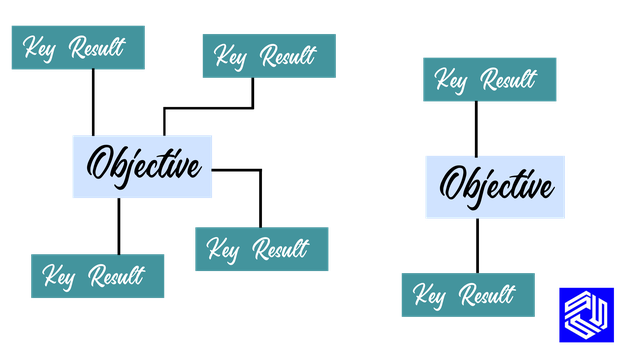
Each objective can have between 3-5 key results and ideally, as a company you want to focus on a few objectives at a time.
OKRs differ from traditional goal setting methods in several key ways. First, OKRs are designed to be measurable and quantifiable, making it easy to track progress towards your goals. Second, OKRs are designed to be aligned with your company's mission, vision, and values, ensuring that your goals are aligned with your company's purpose. Finally, OKRs are designed to be flexible and adaptable, making it easy to adjust your goals as needed.
Defining Your Company's Mission, Vision and Values:
Having a clear understanding of your company's mission, vision, and values is essential for setting effective goals. Your company's mission, vision, and values provide a clear and consistent framework for setting and achieving your goals, and help to ensure that everyone in your company is working towards the same objectives.

Start by defining your company's mission, vision, and values
Defining your company's mission, vision, and values involves a process of reflection and communication. Start by asking yourself what your company is trying to achieve and what values are important to you and your team. Then, involve your team in the process and gather their feedback and input. Finally, refine your mission, vision, and values until they accurately reflect your company's purpose and direction.
It is important to define your company mission, vision and values before developing OKRs. You need to establish a strategic direction for the company from the top, then start to build targets and objectives to achieve those strategic goals.
Develop OKRs from Vision, Mission and Values
A company's mission, vision, and values provide a roadmap for the company's purpose and direction, and inform the decisions and actions taken by the company and its employees. The same is true for OKRs. When a company's OKRs are aligned with its mission, vision, and values, the objectives and key results reflect the company's purpose and direction, and ensure that everyone in the company is working towards the same goals.
For example, if a company's mission is to provide high-quality products and services to its customers, its OKRs should reflect this mission by setting objectives that focus on improving product quality, customer satisfaction, and the customer experience. If the company values innovation and continuous improvement, its OKRs should reflect this value by setting objectives that encourage the company to continually improve its products and services, and to seek out new and better ways of doing things.
By aligning your OKRs with your company's mission, vision, and values, you ensure that everyone in your company is working towards the same goals, and that your goals are aligned with your company's purpose and direction. This helps to ensure that everyone in your company is working towards the same objectives, and that your goals are meaningful and relevant to your company and your customers.
OKRs can be divided into individual and team objectives, and deciding how to assign these objectives between individuals and teams is a strategic decision that can impact the success of your OKRs.
For example, if a company's objective is to increase sales, this objective could be broken down into individual objectives for each salesperson, as well as a team objective for the sales team as a whole. This allows each individual to focus on their specific responsibilities and areas of focus, while also ensuring that the team is working towards the same goal.
Individual Objectives and Key Results (OKRs)
Individual OKRs are objectives that are specific to an individual and their role within the company. These objectives should be aligned with the company's mission, vision, and values, and should reflect the individual's specific responsibilities and areas of focus. Individual OKRs are critical for ensuring that each individual is working towards the same goals, and for tracking progress and performance at an individual level.
For individuals, their OKRs can be integrated into the individual performance management system. Skhokho has a built-in performance management system that integrates OKRs for individual performance, making it easy to track progress and performance at an individual level. This helps to ensure that each individual is held accountable for their objectives, and that they are making progress towards their goals.

Team Objectives and Key Results (OKRs)
Team OKRs are objectives that are specific to a team and their role within the company. These objectives should be aligned with the company's mission, vision, and values, and should reflect the team's specific responsibilities and areas of focus. Team OKRs are critical for ensuring that each team is working towards the same goals, and for tracking progress and performance at a team level.
For teams, their OKRs can be documented in the team targets or performance for the year. This provides a clear and measurable framework for tracking progress and performance at a team level, and ensures that everyone on the team is working towards the same goals.
Setting SMART Goals using the Skhokho OKR Management System:
SMART goals are goals that are Specific, Measurable, Achievable, Relevant, and Time-bound. SMART goals provide a clear and structured framework for setting and achieving your goals, and make it easy to track progress towards your objectives.
Navigate to the Objectives Page of your OKR App
Enter a new objective - Provide the details of the objective, start and end date of the objective, select responsible person for the objective and specify whether this is a team or individual objective.
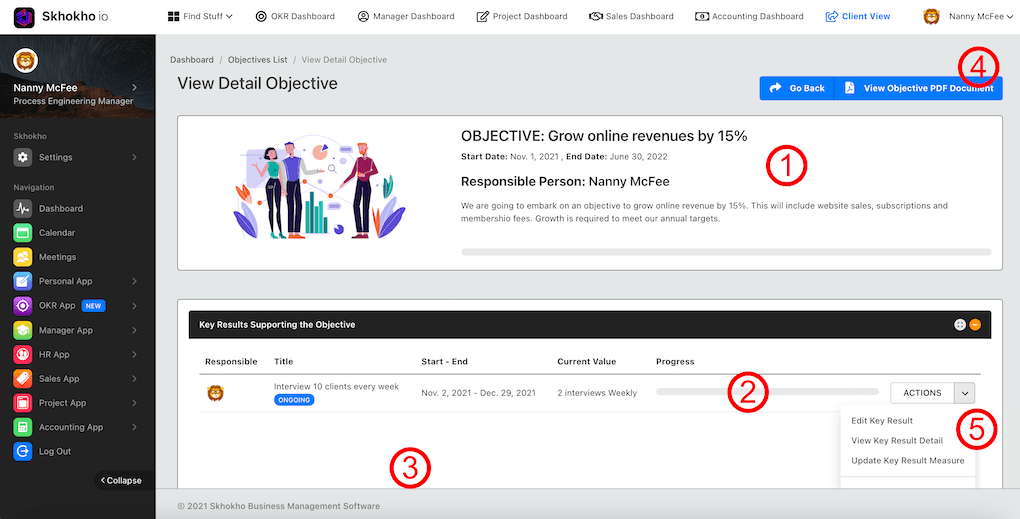
After defining the objective, you will then define the key results that you will use to track your progress towards each objective.
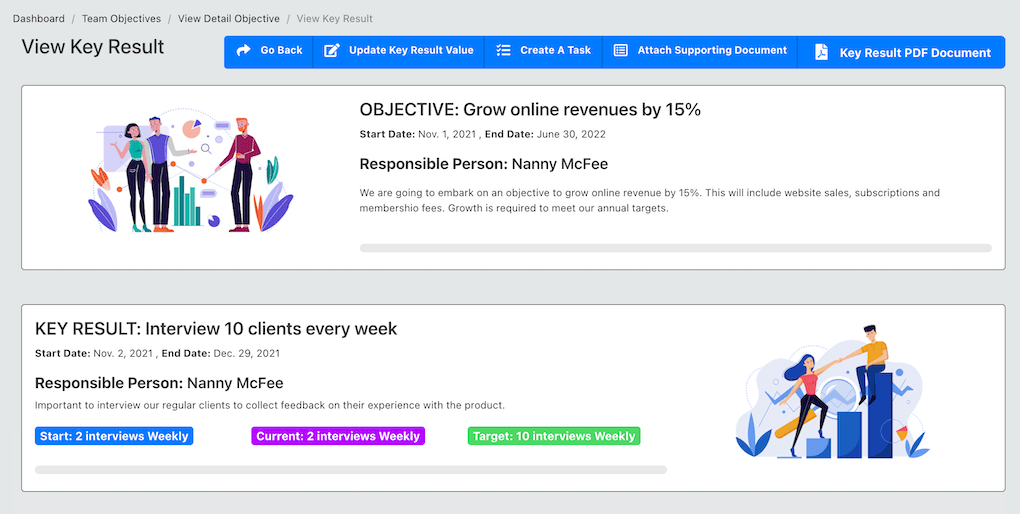
Make sure that your objectives and key results are specific, measurable, achievable, relevant, and time-bound. Then, use the Skhokho OKR Management System to set and track your goals.
Each Key result has a unit of measure and a period or frequency. Skhokho has built in SMART goal setting in to how OKRs can be fined.
Best practices for setting effective and achievable goals
When setting your goals, it's important to be realistic and achievable. Start by setting a small number of high-impact goals and then focus your efforts on achieving these goals. Make sure that your goals are aligned with your company's mission, vision, and values, and that everyone in your company is working towards the same objectives. Finally, regularly review and adjust your goals as needed to ensure that you are making progress towards your objectives.
Creating an Action Plan and Assigning Responsibilities:
An action plan is essential for achieving your goals. By breaking down your goals into smaller, manageable tasks, you can ensure that everyone in your company knows what they need to do to achieve your objectives.
To create an action plan, start by breaking down each of your objectives into smaller, manageable tasks. Then, assign responsibilities for each task to specific individuals in your company. Make sure that everyone understands their responsibilities and that they have the resources and support they need to complete their tasks.
Navigate to a specific key result and create supporting tasks
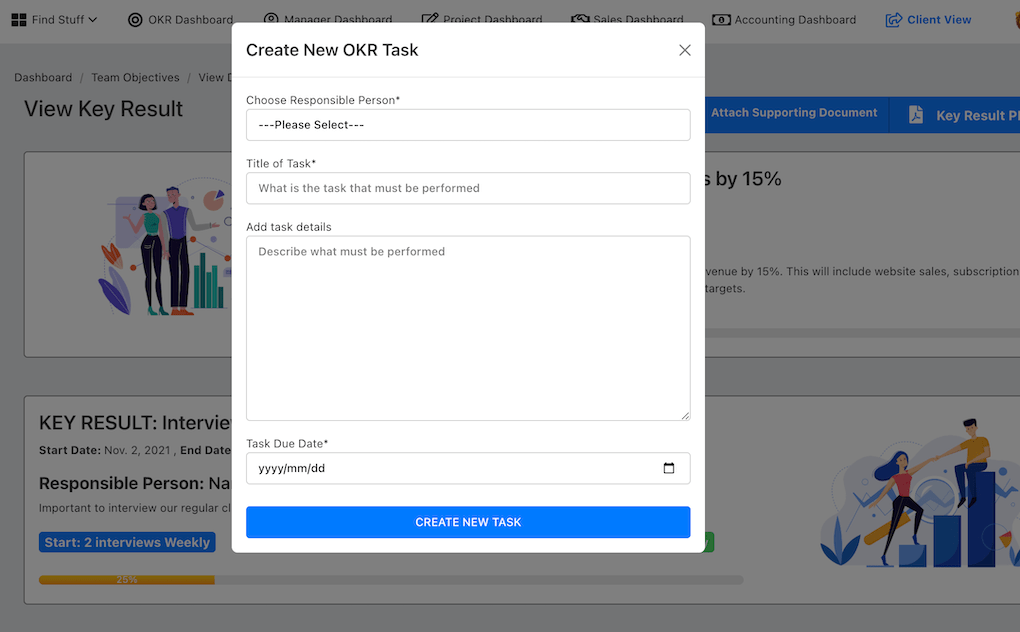
Best practices for effectively delegating tasks and responsibilities When delegating tasks and responsibilities, it's important to choose the right person for the job. Make sure that each person has the skills and experience necessary to complete their tasks, and provide them with the support and resources they need to be successful. Regularly communicate with your team to ensure that everyone is on track and that you are making progress towards your goals.
Tracking Progress and Regularly Reviewing and Adjusting Your OKRs:
Once you have defined your OKRs and set your action plan in place, it is important to regularly track progress on the OKR. Skhokho provides tools for regular OKR check-ups that can be used for teams, individuals and performance management tracking. Tracking progress and regularly reviewing and adjusting your OKRs is essential for ensuring that you are making progress towards your goals and that your goals are still relevant and achievable.
Navigate to a specific OKR - Key Results Detailed Page to report on the progress of the Key Result.
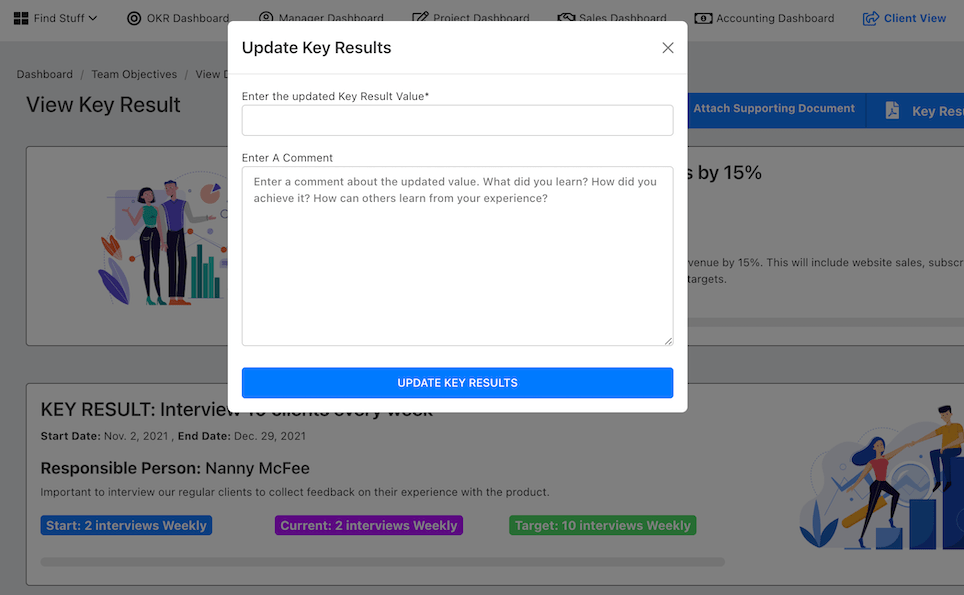
You can:
(1) Enter the current value you are tracking
(2) Enter notes on how you arrived at this number, what you did, what worked and what did not work
(3) Attach documents as back-up
(4) Report on OKR task progress
Dedicate time on a regular basis to review OKR progress
Best practices for regularly reviewing and adjusting your OKRs Regularly reviewing and adjusting your OKRs is important for ensuring that you are making progress towards your goals. Start by setting aside time each quarter or each month to review your progress and make adjustments as needed. If you are not making progress towards your goals, consider adjusting your objectives or key results to make them more achievable. If your goals have changed or are no longer relevant, consider adjusting or replacing them to ensure that you are always working towards the most important objectives.
Get started with Skhokho OKRs
Register for a 14 day free trial here - http://skhokho.io/authentication/register









